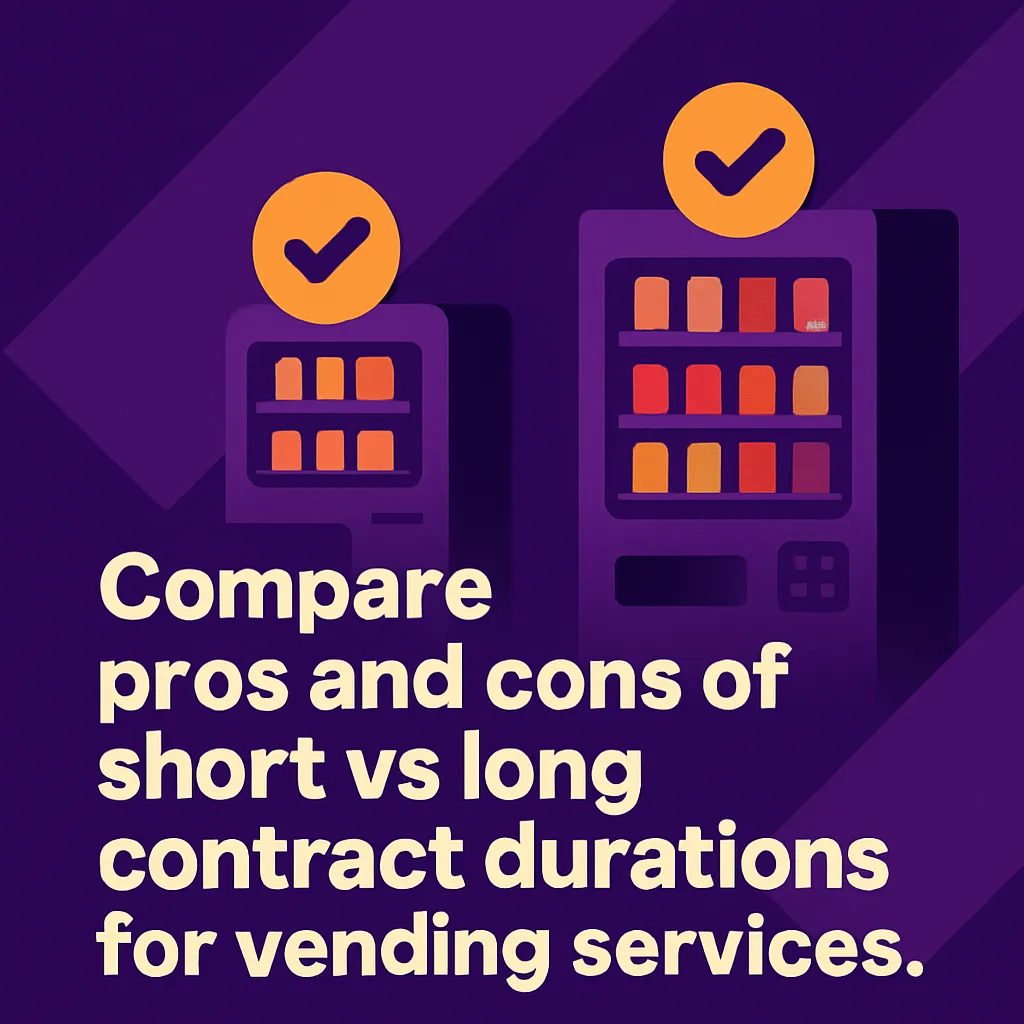Short-Term vs Long-Term Vending Contracts: Which is Right for You?
Compare pros and cons of short versus long contract durations for vending services to make an informed decision for your business needs.
Back to Vending Contracts ResourcesCompare pros and cons of short versus long contract durations for vending services to make an informed decision for your business needs.
Back to Vending Contracts ResourcesChoosing the right vending contract length is a strategic decision that affects operational flexibility, cost, and service quality. Understanding the differences between short-term and long-term agreements is key to securing the best vending solution for your specific business environment.
![]() Short-term contracts offer flexibility and reduce long-term commitment risks
Short-term contracts offer flexibility and reduce long-term commitment risks
![]() Long-term contracts often provide better rates and more dedicated service
Long-term contracts often provide better rates and more dedicated service
![]() Evaluate your business stability and growth plans to determine ideal contract length
Evaluate your business stability and growth plans to determine ideal contract length

When considering vending services, one of the most fundamental decisions a business must make revolves around contract length. The choice between a short-term and a long-term vending contract significantly impacts your flexibility, cost structure, and the level of service you receive. Understanding the nuances of each option is crucial for making an informed decision that aligns with your operational goals and financial strategy.
Short-term vending contracts typically span a period of 6 to 12 months. These agreements are often favored by businesses that are new to vending, organizations with fluctuating employee numbers, or those operating in dynamic environments. The primary advantage of a short-term contract is its inherent flexibility. It allows businesses to test the waters with a vending service without committing to a multi-year agreement. This can be particularly beneficial for startups or companies undergoing significant changes, as it provides an easy exit strategy if the service doesn't meet expectations or if business needs shift. Additionally, short-term contracts offer frequent opportunities to renegotiate terms, potentially securing better deals or upgrading equipment as new technologies emerge. For more insights on typical contractual elements, consider reviewing common clauses in vending contracts.
Conversely, long-term vending contracts usually extend for 2 to 5 years, or even longer. These agreements are best suited for established businesses with stable workforces and facilities. The main appeal of a long-term contract lies in its stability and the potential for better value. Vendors are often more willing to offer competitive pricing, provide higher-quality equipment (including modern vending machines with advanced payment systems), and offer more dedicated service to clients who commit for a longer duration. This can translate into reduced administrative burden, as you avoid frequent contract renewals and vendor searches. Furthermore, a longer partnership can foster a stronger relationship with your vending provider, leading to more responsive service and customized product selections. If your business is considering the specifics of negotiation, understanding how to negotiate a vending contract can be very useful.
Several factors should influence your choice of contract length:
Regardless of your decision, transparent communication with your vending partner about expectations and needs is paramount. Ensure all terms, including commission structures and service agreements, are clearly outlined and understood before signing. By carefully weighing these aspects, you can secure a vending contract that perfectly complements your business strategy.
A short-term vending contract typically spans a shorter duration, often 6 to 12 months, offering greater flexibility and less commitment for businesses getting started with vending services.
A long-term vending contract extends over a more significant period, usually 2 to 5 years or more, providing stability, potentially better rates, and consistent service for established vending needs.
Benefits include flexibility to test services, easier vendor changes, and opportunities to renegotiate terms more frequently as business needs evolve. It's ideal for new businesses or those with fluctuating demand.
Advantages often include locked-in pricing, superior equipment, dedicated service, reduced administrative overhead, and stronger vendor relationships built on consistent service.
Consider a short-term contract if your business is new, your employee count fluctuates significantly, you want to evaluate vending services without a major commitment, or you anticipate rapid changes in your facility.
A long-term contract is ideal for stable businesses with consistent employee numbers, established facilities, and a clear understanding of their long-term vending requirements, seeking consistency and potential cost savings.
Yes, contract terms are often negotiable. Businesses can discuss aspects like product selection, service frequency, commission rates, and maintenance response times with potential vendors, regardless of contract length.
Potential risks include higher per-unit costs, less priority for service or special requests, and the need to renegotiate or find a new vendor more frequently, which can be time-consuming.
Drawbacks can include being locked into services or pricing that become less competitive over time, difficulty changing vendors if service declines, and less flexibility to adapt to new vending technologies.
Longer contracts often allow for access to newer, more technologically advanced machines with a wider variety of payment options and products, as vendors are more willing to invest in locations with long-term commitments.